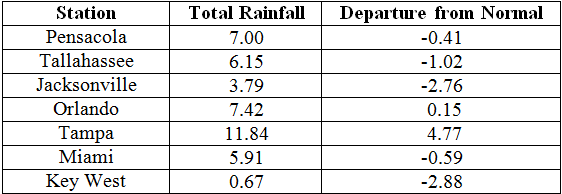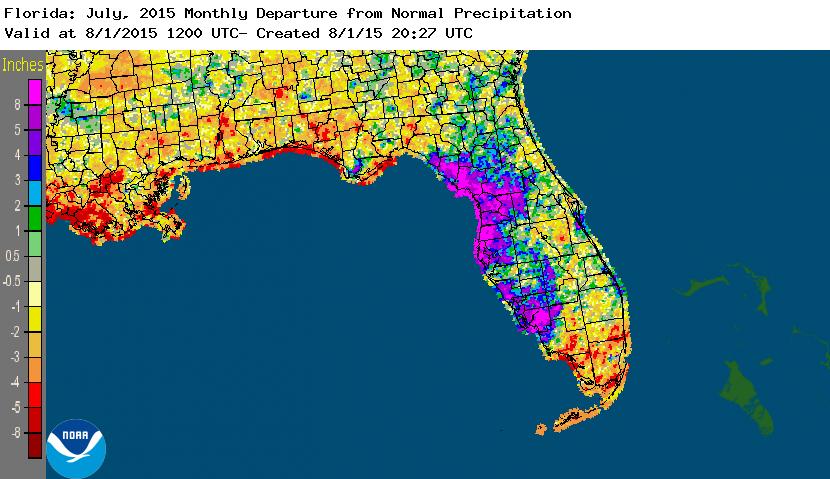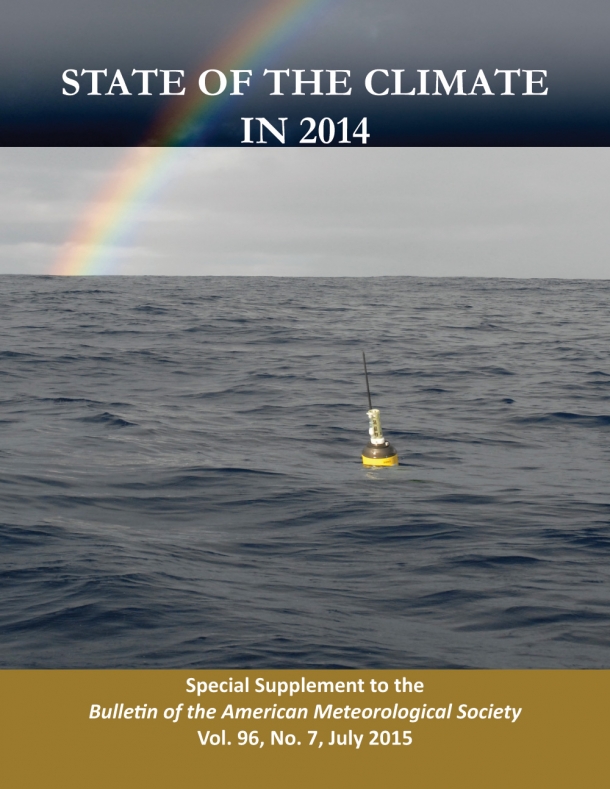|
|
|
|
|
|
|
|
|
|
|
Dear Florida Climate Center Friends,
We'd like to present you with the August 2015 edition of our newsletter. In this newsletter, you'll find our monthly climate summary, information on an event that our staff attended, and a special report. If you have any questions, please email us at climate@coaps.fsu.edu.
Thanks,
The Staff of the Florida Climate Center
 |  |  | David Zierden
State Climatologist | James O'Brien
Professor Emeritus | Melissa Griffin
Asst. State Climatologist |
|
July Climate Summary for Florida
The Florida Climate Center's July 2015 Florida Climate Summary is now available. The summary provides an analysis of temperature and precipitation trends across the state, along with data on hazardous weather, drought, the impacts of the weather, and any records tied or broken for the month. During July, average temperatures were above normal and rainfall totals were varied across Florida. El Niņo conditions are present in the equatorial Pacific. The Climate Prediction Center (CPC) predicts above normal temperatures and normal precipitation for the state through October 2015. Past summaries are archived here.
| July average temperatures and departures from normal (°F) for select cities. |  |
| July precipitation totals and departures from normal (inches) for select cities. |  |
| A graphical depiction of the monthly rainfall departure from normal (inches) for July (courtesy of NOAA, NWS). |  |
|
|
Seed Producers Learn About Climate Variability
The Alabama and Georgia Seed Associations held their joint 2015 Annual Meeting in Destin, FL on July 12th and 13th. The membership consists of over 700 companies involved in seed production and distribution, plant breeding, and other related industries in North America. State Climatologist David Zierden presented at the general session on El Niņo and climate variability. His talk focused on the strengthening El Niņo in the Pacific and what it means for climate and weather through the end of 2015. The talk was well received as seed producers were very interested in predicted climate around harvest time this year.
|
|
Special Article: 2014 State of the Climate Report Released
 In the middle of July, the State of the Climate in 2014 report was released online by the American Meteorological Society (AMS). The report, compiled by NOAA's Center for Weather and Climate at the National Centers for Environmental Information (NCEI) is based on contributions from 413 scientists from 58 countries around the world. Key findings in the report state that the most essential indicators of Earth's changing climate continued to reflect trends of a warming planet, with several markers such as rising land and ocean temperature, sea levels and greenhouse gases setting new records. It provides a detailed update on global climate indicators, notable weather events, and other data collected by environmental monitoring stations and instruments located on land, water, ice, and in space. In the middle of July, the State of the Climate in 2014 report was released online by the American Meteorological Society (AMS). The report, compiled by NOAA's Center for Weather and Climate at the National Centers for Environmental Information (NCEI) is based on contributions from 413 scientists from 58 countries around the world. Key findings in the report state that the most essential indicators of Earth's changing climate continued to reflect trends of a warming planet, with several markers such as rising land and ocean temperature, sea levels and greenhouse gases setting new records. It provides a detailed update on global climate indicators, notable weather events, and other data collected by environmental monitoring stations and instruments located on land, water, ice, and in space.
|
|
Upcoming Events
August 10, 2015:
Agriculture Solutions Day in Orange Beach, AL
|
|
About Us
The Florida Climate Center is part of a three-tiered system of national, regional, and state climate offices, including NOAA's National Centers for Environmental Information (NCEI - Asheville) and the Southeast Regional Climate Center. The Florida State Climatologist and other staff at the Florida Climate Center provide the following information and services to the people of Florida:
· Climate Data:
Historical weather observations for weather stations throughout the state of Florida. We are able to provide data for most stations from 1948-present.
· Climate Information:
Long-term historical averages for various stations, climate divisions, and the entire state.
· Extreme Event Records:
Information and analyses on extreme events such as freezes, droughts, floods and hurricanes.
· Special Analysis:
With their vast knowledge of El Niņo, La Niņa and climate variability, the State Climatologist and staff can offer expert insight into Florida's climate trends.
· Outreach:
Activities, presentations, and workshops that inform and educate the people of Florida about current and emerging climate issues. We also coordinate volunteers for the Community Collaborative Rain, Hail & Snow Network (CoCoRaHS).
More About Us
|
|
|
|
|
|
|
|